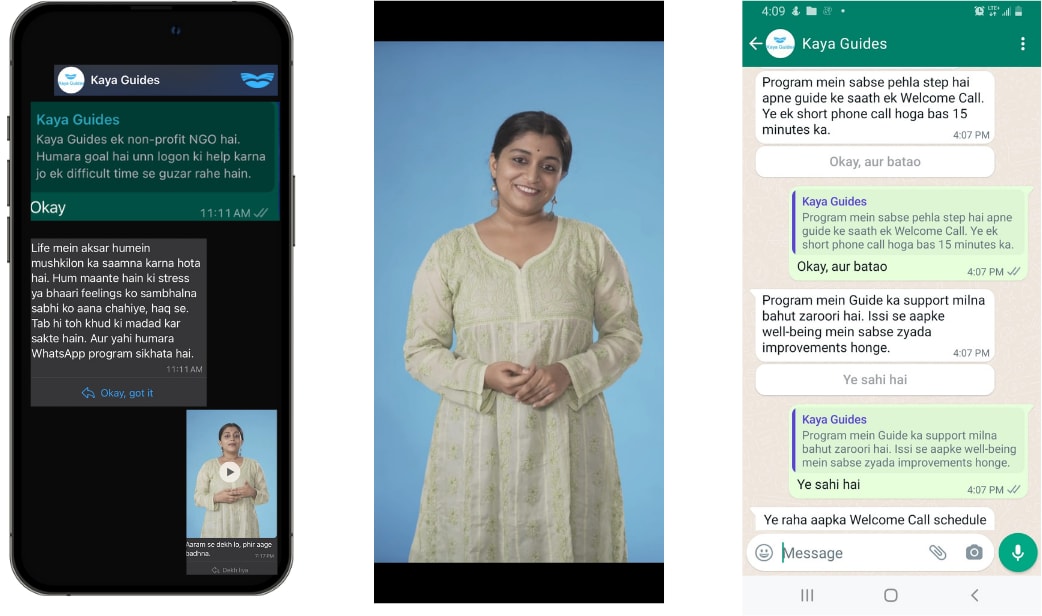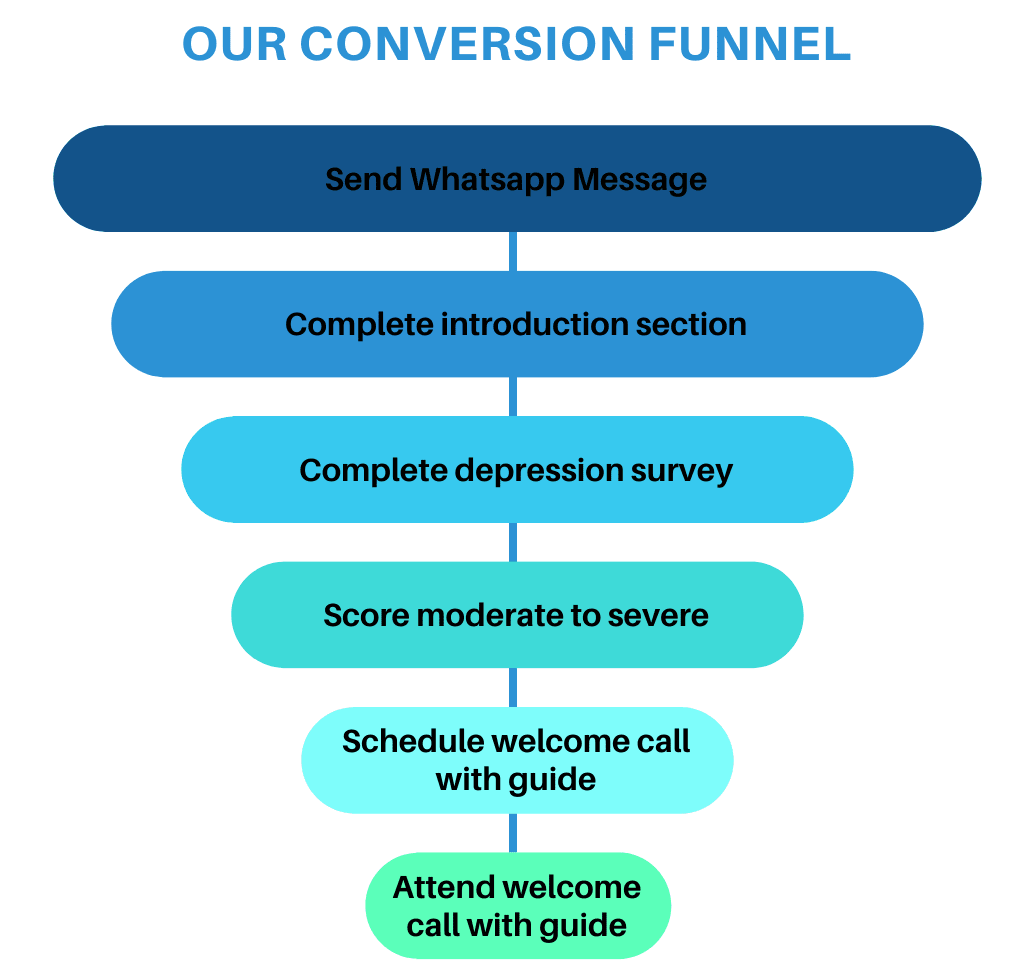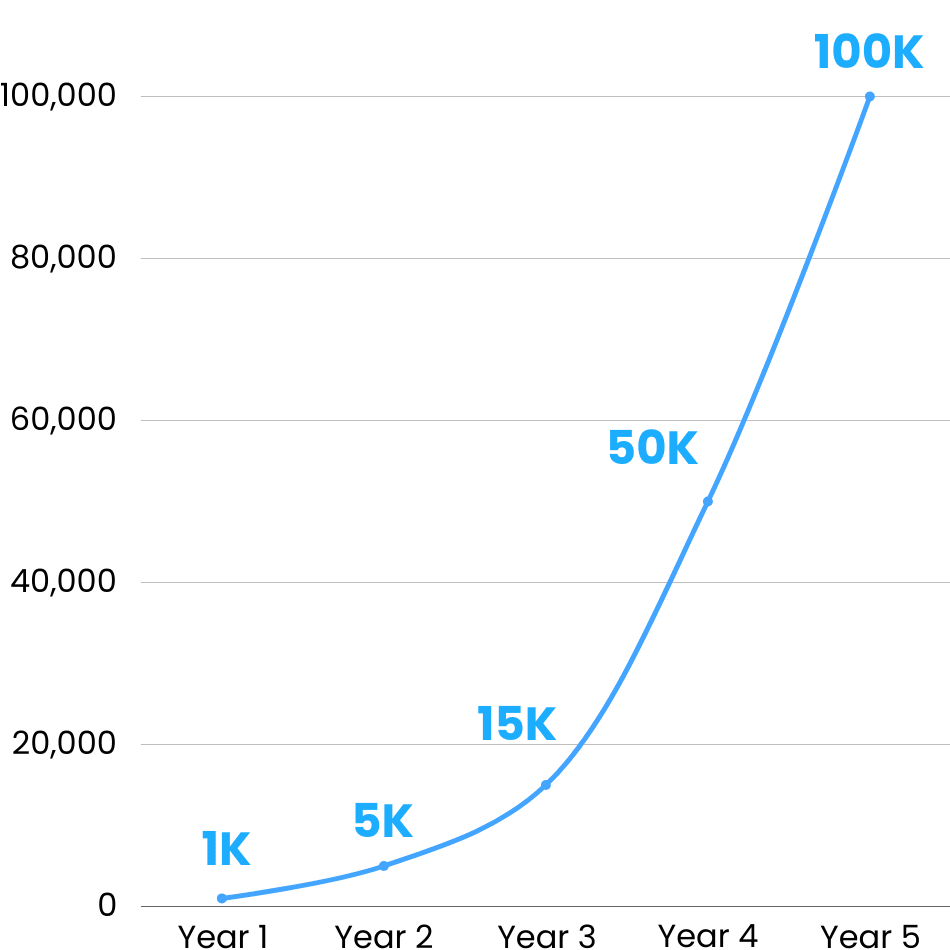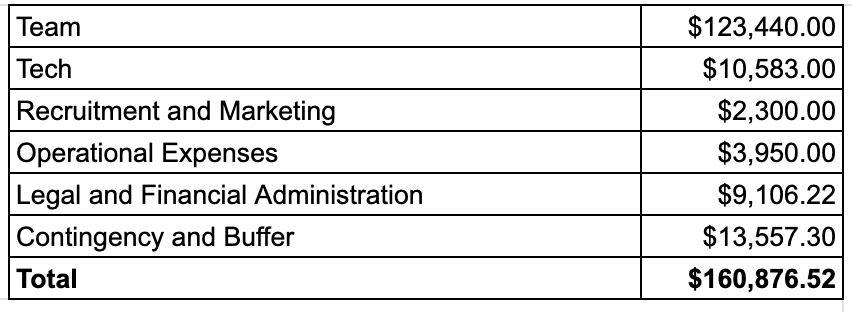Kaya Guides- Marginal Funding for Tech-Enabled Mental Health in LMICs
By RachelAbbott @ 2023-11-26T08:05 (+79)
This post was written by Rachel Abbott, Kaya Guides’ founder.
TLDR
- Who we are: Kaya Guides is a global mental health charity incubated by Charity Entrepreneurship. We operate a self-help program on WhatsApp to reduce depression at scale in LMICs, focusing on youth with moderate to severe depression
- Status: We launched in India this year and are running an ongoing proof of concept with 103 people
- How it works: A WhatsApp chatbot delivers videos in Hindi that teach participants evidence-based techniques to reduce depression. Participants practice the techniques day-to-day and have a 15-minute weekly call with a trained supporter for 5-8 weeks
- Evidence base: Self-help combined with low-touch human support can have the same effects as face-to-face psychotherapy in reducing depression, even if total staff time is less than two hours per participant
- What we've done: This year, we adapted the World Health Organization's digital self-help program to India's context, built a WhatsApp chatbot, produced 40 videos in Hindi, and launched our ongoing proof of concept
- Impact: Delivering on WhatsApp means we can reach those who need it most, at a large scale. The WHO program, studied in two RCTs, had moderate to large effects on depression
- Initial findings: Mental health organizations often struggle with recruitment, but we got 875 people to message the chatbot in 1 month (similar organizations report getting 1K users in a year), achieved a 12.34% conversion rate from initial message to appearing in a guidance call, and only spent $0.97 per acquisition
- Cost-effectiveness: Kaya has the potential to increase subjective well-being 30x as cost-effectively as direct cash transfers by Year 3
- Scaling potential: As a tech initiative, we can scale rapidly and believe we can treat 100K people in Year 5
- 2024 plans: Next year, we'll: 1) 10x our impact from this year by treating 1K youth with depression and 2) Establish the product, team and systems we need to scale rapidly from 2025 onward
- What we need: We're raising $80K to meet our 2024 budget of $160K, having so far raised $80K from the EA Mental Health Funding Circle
What is Kaya Guides and what do we do?
Kaya Guides is a global mental health charity incubated by Charity Entrepreneurship. Our focus is on reducing depression at scale in low and middle-income countries, beginning with India. Youth with moderate to severe depression are our target group.
We deliver a self-help course via WhatsApp that teaches youth evidence-based techniques to reduce depression. During the 5-8 week course, participants have 15-minute weekly calls with trained supporters and practice the techniques day-to-day.
This treatment approach (self-help, plus low-touch human support) is called guided self-help. It was recommended by Charity Entrepreneurship due to its high projected cost-effectiveness. Research indicates that guided self-help has the same effects as face-to-face psychotherapy- even if human support is only 15 minutes per week, the supporter has no clinical background, and the program lasts just five weeks.
Why should we care about mental health?
Mental health disorders account for 5% of global disease burden and 15% of all years lived with disability. This figure is an underestimate: the Global Burden of Disease counts suicide as an injury, even though an estimated 60-98% of suicides are attributable to mental health conditions and 700,000 people die by suicide each year. Depression and anxiety alone account for 12 billion workdays lost annually. Despite the need for expanded mental healthcare, on average just 2% of government health budgets go to mental health.
Scale of the problem in India
We selected India as our first focus country. Mental health disorders in India account for nearly 15% of the global burden. 200 million people in India suffer from a mental health disorder at any given point in time. This is India’s leading cause of years lived with disability, and 40% of all the world’s female suicides take place in India. 85% of people with depression get no help at all, and in a country of 1.4 billion people, there are only 43 government-run psychiatric hospitals.
Kaya's program
- Participants learn techniques to reduce depression through videos in Hindi
- Videos are delivered to their WhatsApp by a chatbot
- They receive 15 minutes of phone support per week from a “guide” or human supporter
- The program is 5-8 weeks, depending on the participant's pace
- We adapted the World Health Organization's digital guided self-help program, which was found to be effective in two RCTs

We deliver on WhatsApp because:
- It enables us to reach those who most need it. Lower-income individuals are unlikely to seek out and download mental health apps- but they do use WhatsApp. Over a third of India's population is on the app.
- It increases the likelihood of retention. People use WhatsApp throughout their day. WhatsApp’s open rate- percent of messages sent that are read- is 98%. In India, users spend an average of 47 minutes per day on WhatsApp.
- It enables large scale. WhatsApp is the world’s most popular messaging app, with 2.24 billion monthly users.
What we’ve done so far
We launched our program in India this year and are currently running our proof of concept with 108 people.
To get to this point, we:
- Adapted the World Health Organization's guided self-help program to India’s context and translated to Hindi
- Produced 40 videos in Hindi in partnership with a youth media organization
- Built and launched a WhatsApp chatbot to deliver program content
- Hired and trained a ‘guide’ to interface with participants and established clinical protocol
- Recruited 108 participants with moderate to severe depression through Instagram marketing
We're the first NGO in the world to implement the WHO's program outside of a research context, having gained early access. We'll be sharing our learnings with the WHO to help shape the program for future implementers. We recently contributed to their manual for self-help programs, which will serve as a guide for implementing organizations worldwide.
Initial findings
We expected recruitment to be difficult, as it’s one of the biggest challenges mental health nonprofits face. Instead, we saw the following results:
- 875 people sent a message to the chatbot in one month of advertising. We spoke to similar organizations who took a full year to acquire 1K users
- 12.34% conversion rate from sending an initial exploratory message to appearing at the first guidance call. This conversion rate is almost unheard of: in the for-profit sector, 2% would be considered very good, and unlike for-profits, we actively filtered people out

- 82.65% of people who completed the depression questionnaire scored in the moderate to severely depressed range, demonstrating that we were highly successful at recruiting our target population
- $105 total spending ($0.97 per person) to recruit our target number of participants, almost exclusively through Instagram ads i.e. minimal staff time was required
Overall, these are some promising early indicators that we may have found product-market fit.
Further results on retention, engagement and treatment response are forthcoming after our pilot has concluded.
Expected Impact
Results of the WHO's 2022 RCT:
- Moderate to large effects on depression, anxiety, and subjective well being
- Significant effects maintained at 3-month follow-up
- 20.8% of people remitted completely (depression-free)
- 6-point average reduction on the depression questionnaire, equating to more than a full classification in the severity of a diagnosis
In India, the WHO program will have larger effects than what's reflected in the RCT: the control group in their study still received psychological treatment, whereas very few of our participants would receive any other form of mental healthcare.
Based on the WHO's program structure, we should be able to significantly reduce a person's depression for less than two hours of staff time.
Additional impacts of our program may include:
- Increased income (depression reduces productivity and ability to find and maintain work)
- Household spillovers (well being and economic benefits for other members of the depressed individual's household)
- Benefits of early intervention (we focus on youth: treating mental health conditions early can improve health, education and economic outcomes)
- Lives saved (we work with highly vulnerable people, some of whom experience suicidal ideation)
Cost-Effectiveness and Scale
Because this is a tech initiative, we can scale exponentially in a short time. These are initial rough estimates, but we believe we can scale to a point that we're treating 100,000 people per year in Year 5.

We estimate that at a scale of 15,000 participants, projected for Year 3, the cost per participant (direct costs) could be $9.32 and the marginal cost of treating an additional person could be $3.93. This would make us 30x as cost-effective as direct cash transfers at increasing subjective well being.
Our research into future expenses and growth potential to date has been relatively shallow, so our uncertainty is fairly high. However, we believe these metrics represent a reasonable initial best guess.
Team
Kaya Guides Founder Rachel Abbott has worked in global development since the start of her career. She's worked in early-stage NGOs, social enterprises, and large development organizations such as the world's largest USAID contractor. Having lived and worked in East Africa, Latin America and South Asia, Rachel’s background includes program design and management, impact measurement and analysis, partnership development and fundraising.
Clinical Director Rashi Sinha is a clinical psychologist who has consulted for large global NGOs such as Girl Effect. She focuses her private therapy practice and consulting work on serving marginalized populations.
Developer Akashdeep Bhagat specializes in WhatsApp chatbots and has led tech teams for organizations such as Saajha, a reputable Indian education NGO engaging 100K users on WhatsApp.
Guide Para Raturi is a psychology student with prior digital mental health experience and certification in suicide prevention.
What we’re going to do now
Next year, we’ll 10x our impact from this year by treating 1,000 people with moderate to severe depression. However, our main goal for 2024 is to set ourselves up for rapid scaling from 2025 onward.
We will:
- Adapt the program based on lessons learned during the pilot
- Strengthen our tech to be able to accommodate large numbers of people
- Run A/B tests to identify the product design that leads to the highest retention and behavior change, reducing the risk of high participant dropout
- Automate our M&E systems to enable accurate, real-time insights on our impact
- Build a strong team capable of scaling our work to help millions of people
Marginal funding- what we need
Our total 2024 budget is $160K, and so far we’ve raised $80K from the EA Mental Health Funders Circle. We're raising another $80K to meet our goals for next year.
This is a high-level budget breakdown:
In 2024, our team will include:
- Founder
- CTO: Create and oversee technical strategy and operations
- Clinical Director: Supervise guides and ensure clinical safety of program
- Guides (2): Directly interface with participants
- Product Manager: Create an engaging and easily usable product that maximizes retention and efficacy
- Developer: Execute tech strategy
- Operations Manager: Lead finance, legal, HR, and admin functions
Impacts of different donation amounts
- $1K: Fully cover our direct recruitment expenses for the year
- $2K: Develop partnerships to expand recruitment channels, which will help drive down our recruitment costs over time
- $5K: Hire a guide to interface with participants
- $10K: Strengthen tech platform to be able to accommodate large numbers of people, addressing our biggest current bottleneck to growth (technical malfunctioning)
- $20K: Identify the product design that will lead to strong retention, by conducting A/B testing and gathering detailed participant feedback
- $40K: Directly operate the program to treat 1,000 youth with moderate to severe depression
Why should you contribute?
- Next year is a pivotal year. If we can build out a top-notch team and establish a strong product that successfully retains participants, we’ll be well-positioned to start scaling rapidly.
- We don’t need much money. We’ve kept our budget lean and we can do a lot with a small amount of funding.
- Your donation has significant counterfactual value. Within the global development space, funding for mental health is hugely neglected.
- We use a direct delivery model, so we have higher certainty of our impact than initiatives that rely on successful third party delivery.
- There are surprisingly few EA organizations implementing scalable tech solutions to improve health. We plan to contribute learnings, offer advice and hopefully pave the way for more.
How to Donate
You can donate here! Donations are tax-deductible for US tax residents.
We really are grateful for any level of donation and would be happy to have a conversation. Please reach out- rachel@kayaguides.com.
*A few of the numbers on this post have been slightly revised- we caught an error, we originally reported 111 participants but actually had 108.
